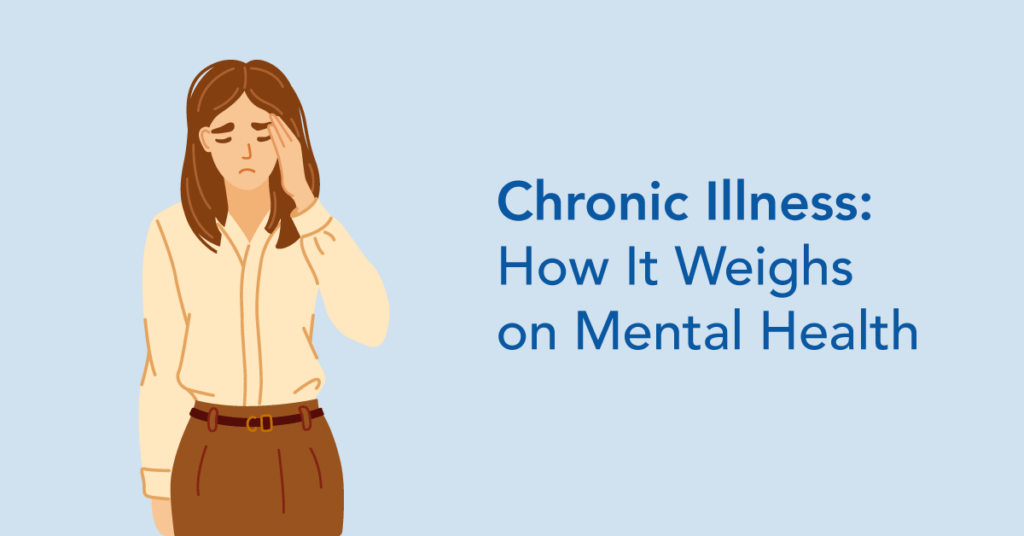If you’ve been diagnosed with a chronic illness, you’re not alone. It’s estimated that 129 million Americans have a chronic illness, with an increasing number of people having multiple conditions. For many people, chronic illness and mental health go hand in hand. Managing a chronic condition often causes anxiety, stress and depression.
The good news is that there are resources for managing your mental health as you navigate a chronic disease diagnosis. Let’s explore the connection between mental health and chronic disease, as well as ways to cope.
The Emotional Toll of Living With Chronic Illness
Receiving a chronic illness diagnosis can cause a variety of natural emotions. You might feel shocked if you don’t have risk factors or a family history of the illness. For some people, the diagnosis causes anger or sadness.
As you learn more about your condition, you might feel anxious or stressed about the future. It’s normal to wonder how you can manage your treatments. This is sometimes complicated by financial factors if the costs of medication and treatment are high. You might worry about the progression of the disease and what it means for your future plans.
For other people, the emotional toll comes from adjusting to the new normal. Many chronic illnesses affect your day-to-day routine. You might need to change your diet to slow the progression. For some conditions, you might have to carry medications with you or test yourself regularly. One example is testing your blood sugar levels when you have diabetes.
Other people feel embarrassed that they developed a chronic disease. They might worry that people will judge them or assume they have unhealthy habits.
Another possibility is developing chronic illness depression. Estimates show that depression symptoms affect about one-third of people with a life-changing chronic condition. This can develop due to the overall emotional toll of the situation, but other factors can impact your mental health. For instance, some medications prescribed for chronic illnesses can cause depression. Chronic pain related to the illness may lead to depression as well. If the condition causes changes to the brain, those changes can also increase the risk of depression.
The Connection Between Physical and Mental Health
Your physical and mental health might seem separate, but they’re strongly connected. That makes sense when you think about how your body reacts to certain situations. For example, if you’re anxious, you might end up with a headache or an upset stomach. Your emotions manifest as physical symptoms.
The connection goes both ways. That means poor physical health can affect your mental health, and poor mental health can cause you to have physical health issues. Put another way, having either a physical or mental health condition increases your risk of developing the other.
Coping Mechanisms for Managing Mental Strain
Learning coping mechanisms for chronic illness mental health concerns can help you balance your physical and mental health. Managing the physical aspects of your chronic illness is an important start. Seek treatment early and follow the recommendations of your health care providers to keep your condition under control.
The following coping mechanisms can help you manage the mental aspect of having a chronic disease:
- Connect with your loved ones. Reach out to your friends and family for emotional support. Staying connected to the people you love can improve your mental health.
- Seek a supportive community. Connecting to other people who have a chronic illness could create a support network that helps you. Look for support groups online or in person.
- Reduce stress. When possible, look for other areas of your life where you can reduce stress. For example, can you cut back on some commitments to focus more on your mental health? Perhaps you need to reduce your contact with people in your life who make you feel stressed.
- Make an action plan. Having a chronic illness may cause you to feel like you have little control over your life, which can affect your mental health. While you can’t change everything, you can take charge and face the diagnosis head-on. Make a plan for the aspects you can control, such as changing your diet or establishing a new routine to accommodate your disease.
- Get moving. Some chronic conditions may make exercise more challenging, but moving your body in ways that make sense for you can help with coping. Exercise can help ease pain for some people. It also increases the chemicals in your brain that make you feel better mentally. For some people, exercise is a welcome distraction that helps take their mind off their worries.
- Practice mindfulness. Meditation, yoga, visualization, breathing exercises and other mindfulness practices often help reduce stress. Try different methods to find the options that work well for you. Then, add them to your daily routine to maximize the benefits.
- Get professional help. Working with a mental health professional gives you a personalized approach to managing chronic illness mental health concerns. They use professional therapy methods to work through your concerns with you. You also learn additional coping strategies based on your preferences and needs.
Seeking Support and Resources for Holistic Care Related to Chronic Illness and Mental Health
Managing a chronic condition is often more effective with a holistic approach. Working with your health care providers and specialists addresses the physical aspect of disease care. A mental health professional helps round out your care to manage the physical and mental health connection. Those professionals, combined with your personal coping mechanisms, can help you develop a positive connection between your chronic illness and mental health.
If you’re dealing with chronic illness and mental health concerns, Mental Health Hotline can help. We connect you to reputable, trustworthy mental health care providers available nationwide. When you find the right mental health professional, you get the support you need to work through chronic illness depression. Contact Mental Health Hotline today to connect to the resources you need.


